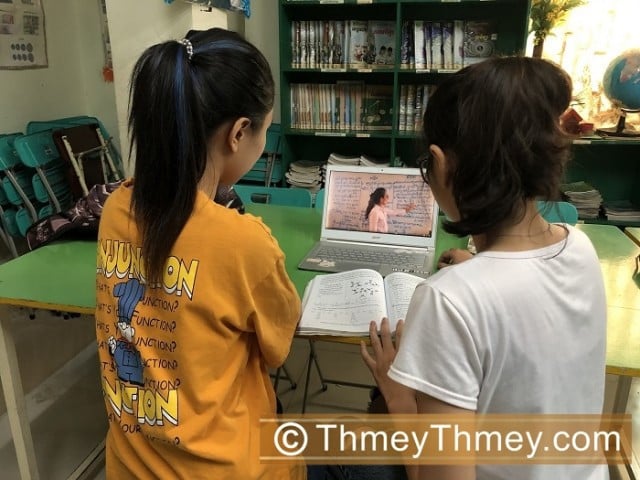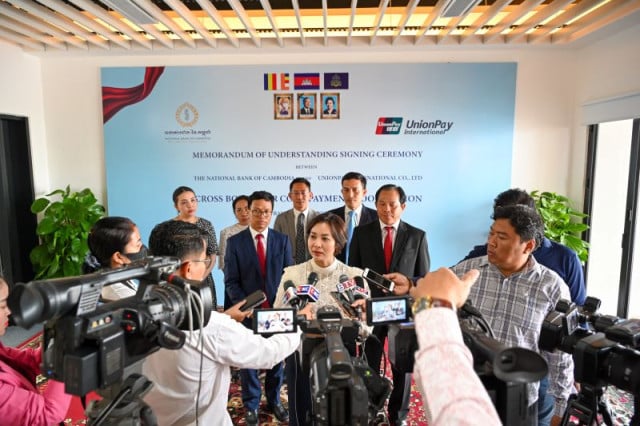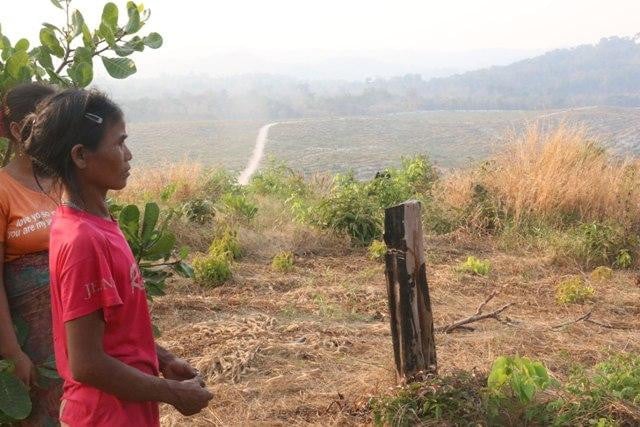Challenges and Opportunities of Online Learning in Cambodia during COVID-19

- Phearun Chhoeurm
- November 30, 2020 2:22 AM
The Novel Coronavirus (COVID-19) outbreak was declared as a global pandemic in March 2020 by the World Health Organization. In the middle of March 2020, educational institutions worldwide moved to online learning.
In Cambodia, the Ministry of Education, Youth and Sport (MoEYS) suddenly announced the closures of all schools and universities to prevent any potential widespread transmission of the virus. Although MoEYS later reopened all schools and universities across the country, every educational institution must practice blended learning, maintain sanitation and follow health guidelines for COVID-19.
The COVID-19 crisis has provided both challenges and opportunities for Cambodian education, particularly as regards the transformation of education from face-to-face classrooms to online learning. Because of COVID-19, educational institutions have shifted to online classes, posing enormous difficulties for teachers and students.
Despite the many challenges, COVID-19 is seen as an opportunity for educational reforms and digital transformation of education. His Excellency Hang Chuon Naron, the Minister of Education, said that the challenges caused by the global pandemic can be turned into an opportunity by implementing digital education and improving the equality of accessibility and broadband internet connection.
Challenges of Online Learning amid the COVID-19 Crisis
The emergency school closure and the immediate transformation to online classes have affected millions of students nationwide. It has been reported that over 1.4 million Cambodian students are unable to access e-learning platforms during COVID-19. Having low digital competency and limited online learning-related experience and training, teachers and students especially those living in remote areas have been struggling with virtual education, causing unprecedented burdens and anxieties, stress, and other psychological problems. Lack of knowledge of how to use sophisticated online learning and communication platforms, such as Google Classroom and Zoom, together with the lack of digital literacy skills, has increased difficulties for educators and learners.
While accommodating the contemporary changes in technology-based teaching and learning, teachers and students have encountered another significant obstacle regarding limited affordability. Some provincial students, especially those who are from low socioeconomic backgrounds, are the most vulnerable to fall behind since they do not have adequate technological devices, such as smartphones, computers, and tablets, to access their online learning, resulting in insufficient bandwidth and significantly less active performance. Although some students living in the city can afford their e-learning materials, high-cost internet services are still the inevitable issues. Yet, they also face other challenges, including noise distraction and limited digital literacy skills.
During the school closures, even though MoEYS in collaboration with related partners immediately launched new online learning initiatives for students from grade 1 through 12 to promote distance learning and enhance optimal utilization of the information and communication technology (ICT), there are still a great number of challenges in terms of accessibility and connectivity. Students at all levels of education tended to simultaneously share similar problems, particularly unstable internet connection.
Consequently, children in some far-flung areas of Cambodia dropped out of school while some university students decided to temporarily suspend their studies, awaiting schools to reopen. Thus, the gap in socioeconomic status of students and their low digital competency have caused online learning to exacerbate the educational inequality confronting Cambodia.
Opportunities of Online Learning during the COVID-19 Pandemic
Despite facing considerable challenges, Cambodia has made an effective emergency response to avoid community transmission, resulting in great COVID-19 success. Although, as some argued, Cambodia’s COVID-19 victory needs to be acknowledged and applauded, social distancing and sanitation practices are still undeniable responsibilities of every individual regardless of the reopening of schools and universities or the continuation of online classes and blended learning.
Interestingly, having been through virtual learning and teaching for over eight months, some teachers and students may have viewed this challenge as an opportunity to advance digital competence, change traditional pedagogical approaches, and accelerate the digital transformation of education.
From another perspective, off-campus learning is seen as a blessing as it enables students to improve their independent and self-paced learning through a wide variety of digital platforms. Students are able to choose their optimal study environment and suitable study time. Over 200 video lessons are available on MoEYS’ official Facebook page, YouTube channel, and other e-learning platforms, including its related partners such as Kru Cambodia and Komar Rien Koma Cheh. Therefore, students can access online learning anytime they want.
At the same time, digital education has generated extremely beneficial outcomes for educators in terms of the implementation of competency-based teaching approaches in instructional delivery. According to UNESCO, “A teacher delivering video lessons noted that she received high-quality support, including new teaching approaches, learning activities, and hygienic supplies, to ensure continuous education for learners.”
Additionally, home-based learning allows parents and students to strengthen strong bonds during this stressful time. Parents can also have the opportunity to provide care and support to help children continue with their academic endeavors. For teachers and students in the city, they could save time and travel expenses when studying online.
The Way Forward Post-COVID-19
Taking into account all of the issues in the time of the pandemic, Cambodia must consider and promote the continuity of online education since it plays pivotal roles in bringing about positive change, potentially moving Cambodia toward a technology-based society. The distinctive rise of distance learning worldwide during the COVID-19 outbreak is a key indicator showing that online learning would be as useful as traditional face-to-face education if practiced in the right way.
In light of the significant challenges facing the country’s education sector from pre-primary to higher education levels, Cambodia must continue to integrate ICT into education by using a range of collaboration tools and engagement methods that promote blended learning, e-learning, and especially long-life learning.
MoEYS in collaboration with various partners must continue to bolster the capabilities of teachers and students and equip them with distance-learning knowledge, technological literacy skills, and 21st century skills.
Reflecting on the current situation, Cambodia must maintain robust socioeconomic development to ensure that there is no significant gap between privileged and disadvantaged students in education while providing financial resources to support ICT integration to improve technological accessibility, availability of e-learning resources, and reliable internet connectivity.
Moving forward, educational research should be prioritized as it would determine the future of Cambodia, transforming the kingdom into a knowledge-based society. It is also agreed that the education and research are vital for the country as it seeks to increase its relevance and competitiveness in the region.
Thus, having optimistic perspectives about the considerable benefits of research, the Minister of Education has been putting high efforts to promote a vibrant research culture and expand research capacities of Cambodian higher education institutions, lecturers, and students through various training research workshops and research competition. MoEYS and the Rector Council of Cambodia have, for example, organized the Annual Student Research Competition and Samdech Techo Hun Sen’s Research Prize, aimed at empowering Cambodian students to build their research capacity.
Overall, in the context of Industry 4.0, changing to online classes could be a catalyst for establishing new initiatives and methods to support student education at all levels. Quality education and research will lead Cambodia toward prosperity and development.
Phearun Chhoeurm is an intern at Cambodian Education Forum. He is a senior student pursuing Bachelor’s degree in Professional Communication and Tourism Management in the Department of English, Royal University of Phnom Penh and the Tony Fernandes School of Business, the University of Cambodia, respectively. Currently, he is also a selected Cambodian Student Ambassador at STEP Sociovation Forum in Singapore.
This article was originally published by Cambodian Education Forum on November 25, 2020.















